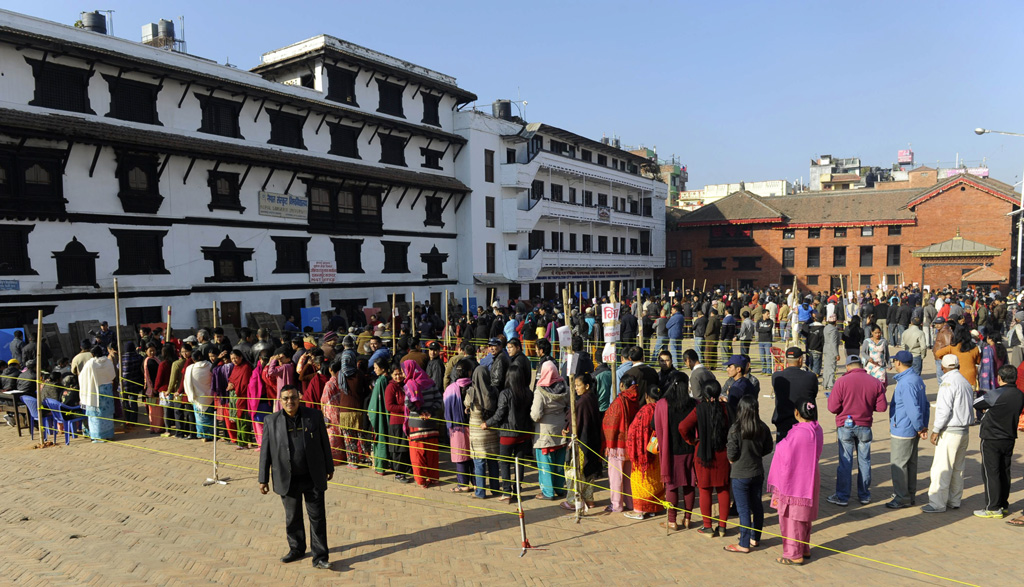
A bombing in the capital Kathmandu early Tuesday injured three children, but the explosion and a campaign of intimidation by a hardline Maoist splinter group did not prevent turnout reaching at least 65 percent.
At this level it would be higher than the 63.29 percent turnout recorded during the country's first post-war elections in 2008, when it voted for a constituent assembly tasked with writing a new constitution.
Since then, five prime ministers have served brief terms, the country had no leader for long periods, and the 601-member assembly collapsed in May 2012 after failing to complete the peace process.
"My vote is for the future of youngsters and the new generations," 101-year-old voter Lal Bahadur Rai told AFP in a phone interview from a polling station in northeastern Sankhuwasabha district.
Many analysts had judged the national mood to be downbeat as threats of violence and intimidation added to years of political infighting and drift.
Hopes of political unity to complete the peace process were dashed when a 33-party alliance, led by the splinter Communist Party of Nepal-Maoist (CPN-M), announced that it would boycott polls and intimidate voters.
In recent days, protestors have torched vehicles and hurled explosives at traffic, leading to more than 340 arrests and one death.
In Kathmandu, a crude bomb explosion planted in a middle-class residential neighbourhood was the only major violent incident amid a security crackdown which saw 50,000 soldiers and 140,000 police deployed.
"I was passing by when I saw three children lying on the ground, crying for help," 28-year-old eyewitness Saroj Maharjan told AFP at the scene.
"One of the children, whose face was covered in blood, fainted in my arms as I carried him to a nearby hospital," he added.
The Maoist party, led by Pushpa Kamal Dahal, known better by the nom-de-guerre Prachanda, swept the first constituent assembly polls in 2008, two years after signing a peace deal.
Prachanda, the former rebel leader whose lavish lifestyle has alienated many core supporters, voted in the southern district of Chitwan in the morning wearing a shirt and Western-style black suit.
Organising the election has been a logistical headache in a country home to eight of the world's 14 highest mountains, requiring helicopters, horses and porters to deliver ballot boxes to remote areas.
"Some of the voters have trekked for five hours to reach here. They include elderly as well as young first-time voters," Gitachari Acharya, an official at the nearest polling station to Mount Everest, told AFP.
Nepal's political deadlock in the last five years has had a severe impact on the economy, with annual GDP growth tumbling from 6.1 percent in 2008 to 4.6 percent last year, World Bank figures show.
With 39 percent of the country aged between 16 and 40, according to government data, jobs are a major issue for young first-time voters like Urmila Maharjan.
The 22-year-old Kathmandu-based student told AFP she hoped "the new assembly will address issues like unemployment".
Voters at one central Kathmandu polling station applauded and chanted, "victory to Nepal" as election officials packed up ballot boxes.
More than 100 parties, including three major ones -- the Unified Marxist-Leninist, the Nepali Congress and the Maoists -- are fielding candidates for the constituent assembly, which will also serve as a parliament.
"Had the anti-poll groups organised peaceful protests, they could have questioned the legitimacy of the elections," Akhilesh Upadhyay, editor in chief of The Kathmandu Post, told AFP.
"How can they gain political traction while even children have been brutally attacked?"
The Maoist splinter group had said the vote could not be held under the interim administration headed by the chief justice of the Supreme Court and wanted polls to be postponed until a cross-party government was put in place.



1725030039-0/Untitled-design-(2)1725030039-0-165x106.webp)
1725366721-0/kyle-(1)1725366721-0-165x106.webp)



1732707402-0/Untitled-design-(8)1732707402-0-270x192.webp)








COMMENTS
Comments are moderated and generally will be posted if they are on-topic and not abusive.
For more information, please see our Comments FAQ